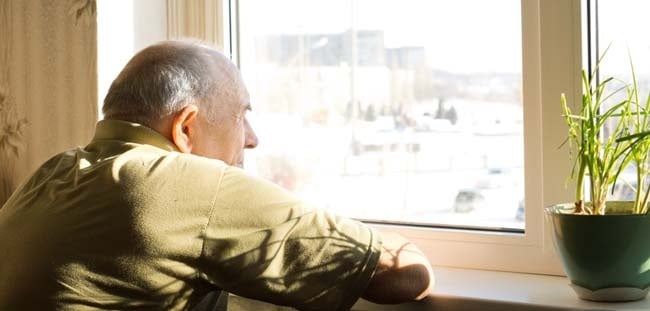Caring for a loved one with Alzheimer's disease involves constantly worrying about hazards. Seniors with Alzheimer’s disease experience a variety of symptoms that could cause them to fall, putting them at a higher risk for injury. For example, they may have difficulty understanding spatial relationships. As a result, they may have trouble with balance and depth perception, which can lead to a fall. Seniors may also not remember how to do everyday tasks, like walk correctly or sit down in a chair. Because of changes in memory and behavior, everyday objects can quickly turn into hazards.
The following guide to safety devices is meant to help caregivers identify hazards and make the living environment safer for their loved ones with Alzheimer’s disease. We will walk through different rooms in the home and identify home safety devices that can create safe rooms for your loved ones with Alzheimer's or dementia.
Bathroom
Slipping and falling in a bathroom is a real risk and could lead to serious injury. In fact, 80% of all falls happen in the bathroom. Therefore, the risk of a fall needs to be minimized. Luckily, there are many devices you can install to make it safer for your loved ones.
Grab Bars
Grab bars are simple safety devices that can provide stability and support to seniors with Alzheimer’s and dementia. Seniors can grab the bars to help them get up or regain their balance. Consider installing grab bars near the toilet, by the edge of the bath tub, and inside the shower.
Non-Skid Mats
It’s common for the floor to get wet in the bathroom, which can become slippery and dangerous. Likewise, the shower itself can become slick and lead to senior falls. Use a non-skid mat in the tub and on the floor adjacent to the tub, toilet, and sink.
Shower Chair
Another device that can help seniors stay safe in the shower is a shower chair. These sit in the corner of the shower or tub and provide a place for a senior to sit while they get clean. By sitting down, seniors can remain more stable and avoid falls.
Other Considerations
In addition to falls, the bathroom also presents a poisoning risk. Install child-proof latches on all cabinets that contain medicine or cleaning chemicals. This can help prevent your loved one from consuming these potentially harmful substances.
For more ideas on how to keep the bathroom senior-friendly, check out our post: Smart Renovations to Make the Bathroom Safer for Seniors.
Kitchen
Kitchens are typically full of hazards — even to younger adults. The floor can become slick, knives and sharp utensils are within arm’s length, and there are many appliances that can get hot. Consider installing these home safety devices in the kitchen.
Childproof Latches
To keep sharp or heavy objects from the hands of your loved one, consider installing childproof latches on cabinets. You can also install these on cabinets that contain cleaning supplies, breakable items, medications, or other potentially dangerous items in the kitchen. You should also clean out any junk drawers and remove items that seniors might eat or that could be dangerous.
Automatic Appliances
Alzheimer's patients may develop forgetful or unfamiliar behaviors. For example, they may turn on the stove and forget to turn it off. Therefore, you might want to install safety knobs and automatic shut-off switches on the stove and other appliances.
Other Considerations
Scatter rugs present a fall risk, so remove them from the kitchen or replace them with non-skid mats.
Since a person with Alzheimer's may put something down the sink drain, it is recommended that you disconnect the garbage disposal. Also, insert a drain trap in the kitchen sink to prevent something from clogging the plumbing.
A person with Alzheimer's may eat objects that resemble food but aren't. Remove any artificial fruits and vegetables.
For additional ideas on how to keep the kitchen safe, read our senior kitchen safety guide.
Bedroom
While seniors may spend most of the time in the bedroom asleep, it can still pose potential threats to a senior with Alzheimer’s disease. But here are some devices that can help.
Baby Monitor
Install a baby monitor in the bedroom so you will be able to hear when help is needed. For example, a senior may need help getting to the bathroom, they may fall out of bed, or might require assistance with another need.
In addition, attempt to anticipate potential night-time needs and take care of them before bedtime. Consider the following:
- Hunger
- Thirst
- Pain
- Toileting
Minimizing night-time needs reduces the risk of wandering at night. If wandering is a concern be sure to install secure locks on all outside doors and windows. It may also be a good idea to hide a key outside the house in case your loved one inadvertently locks you out of the house.
Smoke Detectors & Carbon Monoxide Detectors
In sleeping areas and throughout the house, install smoke detectors and carbon monoxide detectors. Verify they are functioning properly by conducting a monthly test.
Bed Rails
To help reduce the risk of rolling out of bed or falling out of the bed in the morning, consider adding bed rails to your senior’s bed. They can attach to the bed and provide a barrier or safety support for a senior to remain safe. Some bed rails can fold down so they are out of the way when you know your senior is safe.
Because seniors with Alzheimer’s tend to wander at night, bed rails can also keep them safe within their own bed. They might also wake up and feel disoriented and try to escape their bed because they don’t know where they are. Bed rails can also assist in this case.
We know that caring for a loved one with Alzheimer's or dementia can be a demanding responsibility. Use our Home Safety Assessment for more ideas on how to keep your home safe for your aging senior.


